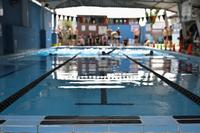If you know you need to exercise but "just can't fit it into your day," perhaps you need a gentle reminder of all the positive benefits and outcomes that being a fit and healthy person offers.
Many people just need a why and some motivation. If you need a why to train, here are several to help support the fitness lifestyle change:
Look better naked. Face it. Most people who train do it purely for aesthetic reasons. Whether it is a sleeveless shirt, a fitted suit, a short skirt or a swimsuit, people want to look good when more skin shows. Both men and women are into bodybuilding -- ripped abs, bigger biceps, strong legs and toned butt. This is one of the great benefits of training, whether it is a primary or secondary reason. It works for many, but there are many more benefits besides looks.
Weight reduction. So many ailments come from being overweight. Insulin resistance, metabolic syndrome, diabetes and heart problems can be improved -- if not completely reversed -- by starting an exercise plan. You do not have to join a gym or spend long periods of time on a treadmill. Just start moving more and eating healthier, smaller portions. Walk more. Bike more. Take a yoga course. Do something. You cannot afford not to.
Controlling blood pressure. Exercise has many proven positive effects, and the number one muscle to receive these benefits is the heart. By exercising, your heart becomes more efficient, working less throughout the day and night while reducing arterial pressure as blood pumps freely through the body. Also, cholesterol levels are improved through exercise and a better diet. This aids in how blood flows through the body, reducing the risk of heart attack and strokes.
Stress relief. Exercise allows an active person to reduce stress levels by helping to metabolize stress hormones. Although your body can become stressed physically during exercise if it's too rigorous, you can reduce stress through steady movement and deep breathing.
Cardio activity, such as running, biking, rowing and swimming, allows the body to take in more oxygen and engages the parasympathetic nervous system, helping the body to relax. Any activity (like yoga or meditation), where you can focus on deep inhales and exhales, will help fight the chronic effects of stress, including diabetes, stroke, heart disease and heart attack. This type of exercise also benefits mental health.
Cancer prevention. Stress, inflammation and poor eating and living habits can cause cancer. Exercise alone cannot necessarily prevent cancer, but according to the Centers for Disease Control and Prevention, physical activity can reduce the risk of various types of the disease.
Diet and physical activity also can reduce inflammation, which interferes with joint and organ function. Although cancer is indiscriminate in its victims, as we age, the chances of getting cancer increase. Do all you can to put yourself in a better statistical grouping.
Boosting immune system. A lack of physical activity can affect the immune system, making it more difficult to fight off common illness as well as major disease. Physical fitness, along with proper sleep and nutrition, will boost your immune system. See how it all fits together? It is that important.
The laundry list of whys
In a nutshell, there are many excellent benefits of physical activity. Start making better choices with the habits you have and pick one (or more) of these motivations if you need a why:
- Weight loss and athletic performance
- Healthy heart and lungs
- Self-esteem/self-confidence
- Reduced stress, anxiety, depression
- Better mood/mindset
- Better energy levels
- Increased mental alertness/work productivity
- Strengthened bones and muscles
- Reduced risk of many diseases (diabetes, stroke, other)
- Reduced risk of cancer
- Reduced fatigue
- Improved sleep
Shoot for 30-60 minutes a day of activity several times a week (at least five days a week).
There are many more whys for the importance of physical training. Find one for you and start the journey from being sedentary to active. Be basic. Just walk 30 minutes a day and drink more water for the first month. After that, consider adding exercises, skills, activities and nutritional changes that make you feel better, look better and live longer.
We do not just focus on hard-core fitness programming for military/spec ops-level athletes. We have many articles and programs to help people start from scratch.
Workout of the Week -- Beginner Programming
Stew Smith is a former Navy SEAL and fitness author certified as a Strength and Conditioning Specialist (CSCS) with the National Strength and Conditioning Association. Visit his Fitness eBook store if you’re looking to start a workout program to create a healthy lifestyle. Send your fitness questions to stew@stewsmith.com.
Want to Learn More About Military Life?
Whether you're thinking of joining the military, looking for fitness and basic training tips, or keeping up with military life and benefits, Military.com has you covered. Subscribe to Military.com to have military news, updates and resources delivered directly to your inbox.
















